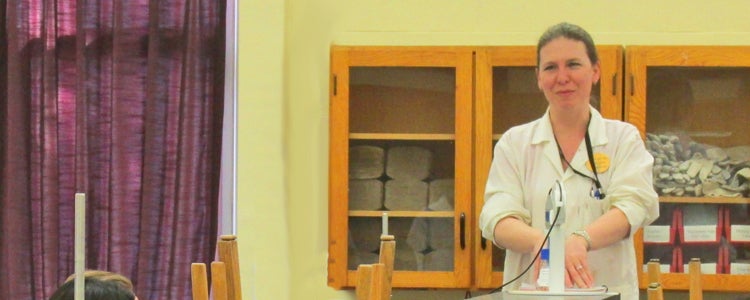Sue Stathopulos: One-on-One Interactions

Sue Stathopulos: Department of Chemistry
Written by Kelly Stone, Special Projects (Teaching Stories), CTE.
The decision to move away from home to attend university is nerve-wracking for many students. As Sue Stathopulos, a first-year chemistry lab instructor, explains, “it’s quite intimidating to come from wherever you’re coming from, regardless of whether you’re arriving from a large high school or a small high school. The university environment is much bigger — classes are considerably larger.” For this reason, Stathopulos works to ensure that her laboratory is a place where students can acquire not just knowledge but also skills and resources to help them with this transition.
As an instructor of first-year students, Stathopulos teaches basic lab skills. In the lab setting, Stathopulos has a hands-on teaching opportunity that most instructors in the classroom do not. “I have the opportunity to interact with students on a one-to-one basis frequently, where lecturers — the classes are huge — they’re one person standing at the front of the room with three or four hundred students.” This is why students enjoy the environment of CHEM 120L and 123L. As Aaron Chan, a CHEM 123L teaching assistant (TA), explains, “Working with Stathopulos is great because she creates a very friendly environment, making it easier to be approachable while teaching, which makes the lab more enjoyable but still informative for most students.”
Outside of the lab, Stathopulos says she likes “to get involved in a lot of first-year activities.” To this end, she has participated in student seminars regarding topics such as how to write lab reports. In conjunction with these seminars, and at the request of past students, Stathopulos plans to offer an open workshop this Fall term. The workshop will focus on the process of critiquing lab reports, to help students feel less overwhelmed by the task of report writing.
Stathopulos also encourages her students and TAs to participate fully in campus life. Since the TAs are closer in age to the students, it is easier for them to “get involved in the students’ lives and find out about them, learn about them, and I think they have excellent success in that.” Stathopulos believes that getting involved and seeing a familiar face every couple of weeks “significantly benefits the students!”
For Stathopulos, the most rewarding part when mentoring first-year students is the “light bulb” moment: “When you see a student ‘get it’ — they finally realize that ‘You know what, I can do this university thing and I don’t have to be intimidated’ — I think that’s the biggest achievement.” In the lab, Stathopulos helps students work towards this light bulb moment by making them more comfortable. She lets them know that making mistakes is an essential part of learning and she drives them to “get involved, in everything. Participate, in everything. Do as much as you can because these opportunities aren’t going to come around again.”
Read more Teaching Stories
More Resources
CTE has developed more than 100 Teaching Tips. Each one is a succinct document that conveys useful ideas and practical methods for effective teaching. Some of the Teaching Tips that are relevant to the strategies mentioned in this Teaching Story include the following: